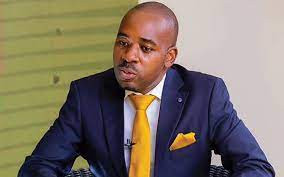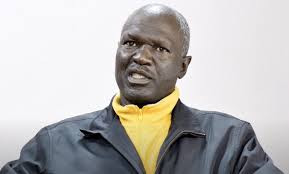
In early 2008, Simba Makoni, with the covert but obvious backing of the late powerful ex-general, Solomon Mujuru, sprung up to the podium and made the brave announcement to stand against Robert Mugabe in that year’s presidential run.
He didn’t do too badly, getting just under 10% of the ballot share despite having launched his campaign in a short space of time. But with Morgan Tsvangirai on the track too, Makoni was never going to turn water into wine. Tsvangirai, as you all know, beat Mugabe.
The official story — after around a month of tossing the ballot numbers about by you know who, when current president, Emmerson Mnangagwa, was the head of Mugabe’s campaign team — was that Tsvangirai failed to get at least 50% plus one votes as the law required for him to become the next president.
But the command centre of public opinion put Tsvangirai’s tally well above that, meaning that there was a popular perception that the Mugabe machinery had rigged. In fact, Didymus Mutasa, a former national security minister, said as much later when Mugabe dumped him alongside Joice Mujuru and the Gamatox camping.
But that’s not the real issue. Taking away Tsvangirai and his MDC, Makoni was a pretty popular guy. What he did after the March 2008 general elections is what matters, though. Post-election, he tellingly told his Mavambo/Kusile/Dawn supporters that they must re-organise themselves without him and consult him once they had new structures. The supporters tried to do that, but that was the end of the Mavambo project because, without Makoni, there was hardly any traction.
Simba Makoni is not the only high profile figure who flattered to deceive. Well earlier, we had Edgar Tekere who, as Makoni did, shot off the Zanu PF block to challenge Mugabe and didn’t make it. When he failed, he still tried later but he finally dried out.
Then we had the likes of Margaret Dongo who made a dramatic mark as a legislator, again, cracking off the Zanu PF block. We also had Dumiso Dabengwa who attempted to reform Zapu at the same time as Makoni was looking to renew the ruling party leadership, and, alter, Joice Mujuru. The plot is the same. In the end, they all sunk into oblivion.
Now, there is the case of Nelson Chamisa. He took the opposition MDC-T by storm when Tsvangirai passed on just before the 2018 elections, virtually robbing the party leadership from his seniors, Thokozani Khupe and Elias Mudzuri. Chamisa went on to become the most popular opposition leader after Tsvangirai in post-independence Zimbabwe, putting Zapu’s Joshua Nkomo aside, of course.
- Young vocalist making southern Africa dance
- Business opinion: Branding in the age of entrepreneurship and industrialisation (Part 6)
- Business opinion: Branding in the age of entrepreneurship and industrialisation (Part 6)
- Plot to block Chamisa thickens
Keep Reading
He ran against Mnangagwa in 2018 and lost narrowly, officially. He challenged his loss at the courts and lost. But that’s mainly because his house was fatally disorganised, choosing to playing more to the gallery than to do serious legal business. In 2023, he stood again against Mnangagwa. He lost again but still enjoyed multi-million support.
Frustrated after making decisions such as leading a constitution-less and structure-less entity that made his party leak like a sieve, resulting in small names taking over the show, Chamisa—without any warning or consultations—resigned from his own CCC party in January this year.
There is talk about a new movement that he is likely to lead, the so-called Blue Movement—after quitting CCC. Informatively, Chamisa has not made his intentions public. All we are now hearing is this yarn about two of his protégés, Amos Chibaya and Gift Siziba, moving around trying to re-mobilise people around Chamisa as their godfather is busy on X rewriting verses from the King James version of the bible.
Question is: Will Chamisa be able to come back and make a good mark on the landscape of Zimbabwean opposition politics once again? Put negatively, is Chamisa not gone for good? The same way Tekere, Makoni, Dongo, Dabengwa and Joice Mujuru went.
Well, these other guys were from Zanu PF, so their stories could be different from that of Chamisa, who was bred by the opposition from that time he was wearing oversized shirts and jackets as a student leader in the late nineties.
But you can’t escape some similarities. For instance, if you notice, Makoni, after losing in his the presidential bid in 2008, withdrew into his shell and told his supporters to organise themselves without having to involve him. Quite like what Chamisa is doing right now amid the blue movement tale, which is close to a myth at the moment.
We hear that Chibaya and Siziba are doing the re-organising on behalf of Chamisa. The two are also putting a solid spin to that claim. For all you care, these two chaps may just be doing their own bidding, after having been booted out of Parliament and meaningful politics by Sengezo Tshabangu.
I’m saying this because there is a seductive theory doing good routines on the ramp as we speak. What if Chamisa was bought?
In essence, this theory says there is a high possibility that Cde ED Mnangagwa paid Chamisa juicy millions to shut him up and get him out of the way.
And it’s tempting to see logic and rhyme in this theory. Have a look, Chamisa and Mnangagwa actually come a long way together.
When Mnangagwa was the head of government business in Parliament, especially in the run-up to the 2017 coup, Chamisa played the then deputy president’s tune well in the August House.
When Mnangagwa had an issue that he needed to be turned into a motion, he used Chamisa. For instance, when Grace Mugabe was taking over the running of government in her husband’s twilight time, it was Chamisa who set the debate on that rolling in Parliament, questioning if it was government policy to have the first lady taking control of its business.
That’s not all. There are tell-tale signs that Chamisa could have gained financially from his connection with Mnangagwa as a fresh advocate that had just graduated from UZ. I’m talking about that infamous Zuva Petroleum (Pvt) Ltd Supreme Court judgment that led to the loss of thousands of jobs.
Chamisa was part of the legal team that represented Zuva against some former company managers who were challenging their dismissal on notice. Because the Supreme Court ruled that an employer could actually give three months’ notice to terminate an employee’s contract, about 6 000 jobs were lost immediately.
This decision had downstream effects that led to the dismissal of some 20 000 employees elsewhere.
The real issue is not exactly about Chamisa’s lack of professional and moral conscience, even though that still matters.
What matters more is the bar and kombi talk that Mnangagwa had links to Zuva as some shareholder.
Mnangagwa’s reported shareholding in Zuva remains a function of speculation because nowhere in the energy company’s books will you be able to find his name.
It’s just that, in Zimbabwe, there is a thin line between rumour and fact. When a rumour keeps repeating, it easily transforms into truth here.
Significantly, a fresh line has just emerged in the media that’s reporting that the President was involved in a Zuva deal with one prominent banker who has just been gifted a powerful position in the financial sector.
I haven’t heard my brother from another mother, George Charamba, the presidential spokesperson, deny that in the past few days. In Zim, silence is the same thing as a yes.
There are other shocking cases in which Chamisa has gone to bed with Zanu PF for the money. Numerous years ago, he went into a commercial venture with Gushungo Holdings where he was providing transport to the late Mugabe’s farm.
From dawn to dusk, Chamisa would lambast Mugabe as a cruel dictator that he was. From the fall of darkness, he would then commute to the Blue Roof to collect his dues from the dictator.
If you lack principles to that extent, you can do anything for the sake of silver.
And, hey, my own eyes and ears have picked that, when Chamisa was severely assaulted at the then Harare International Airport in 2007 on his way to Brussels on parliamentary business, that had nothing to do with the politics.
Instead, my sources have insisted all these years, it was because of a gold deal with a prominent Zanu PF stalwart that had gone sour and this politician, now leaving in exile, used the cover of the volatile politics to get his own back.
Point is, if it is true that Chamisa has been bought out by Mnangagwa, we might just as well kiss him goodbye.
He would rather be chowing those rumoured millions. If he returns, that would only be for the optics, otherwise he is as dead as a dodo.
*Tawanda Majoni writes in his personal capacity and can be contacted on majonitt@gmail.com









